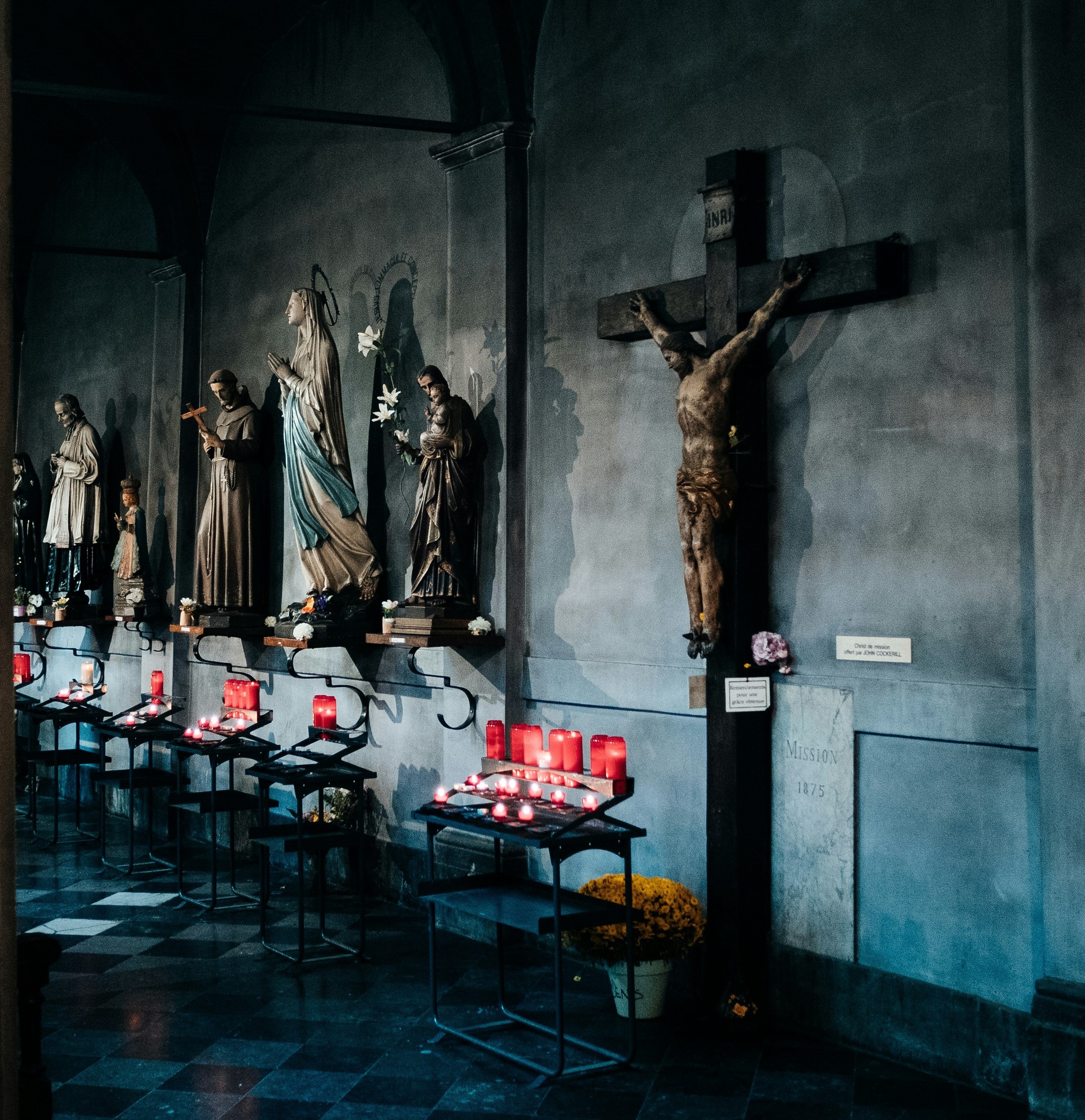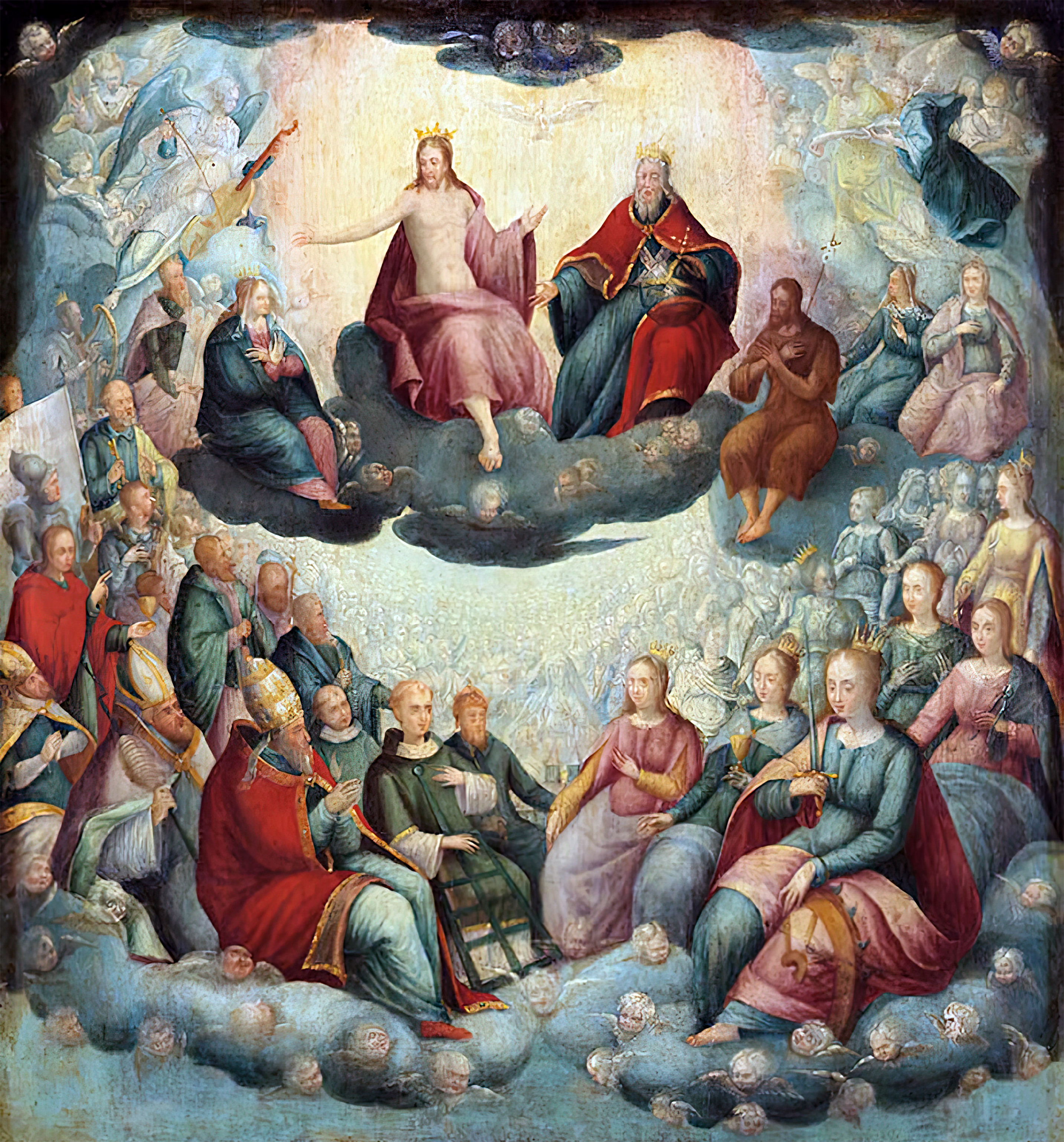Lent is a time that we tend to focus on suffering, fasting, penance, and prayer. All of these are good practices that help us to draw closer to God, but they also help us realize our place in the world. Suffering allows us to see that we live in a fallen world and it forces us to call out to God as our Father. Fasting allows us to break our sinful habits and deny the desires of the flesh so that we can live closer to how we were created to be. Penance forces us to admit that we have done wrong and need mercy from a loving God. And prayer, perhaps the most important of all of them, is entering into communion with the Trinity.
All of these practices have one thing in common, they pull us outside of ourselves and change the focus to God. During this time of Lent I am trying to focus on humility. We all have various gifts that God has given us, whether material or spiritual, and it can be tempting to take these for granted or even say that these gifts are here because of how hard we have worked or what we have done. Instead of falling into this trap, I want to try to be a good steward of the gifts God has given me during this Lenten season.
Our first reading today seems to speak of humble stewardship. Moses spoke to his people and said, “The priest shall receive the basket from you and shall set it in front of the altar of the LORD, your God.” Notice that all that the people are required to do is give. The priest does the offering and God receives it, but the people just need to be open to give. This is an act of true stewardship and true humility when we offer everything we have back to our loving Father in gratitude.
Another thing to notice is that the priest is required to perform the sacrifice. God doesn’t NEED anything from us. It is when we offer everything back to the Father through the sacrifice of His Son that it becomes a pleasing offering. We don’t go to Mass just to worship God but to participate in the worship of the Son on the cross to the Father. In that way, when we tie our sufferings, joys, failures, talents, and miseries, to the sacrifice of the cross, it becomes a pleasing sacrifice to the Lord. It also allows us to see that even worship is impossible without God’s help.
During this Lenten season I encourage you to reflect on your life and start to offer it all to the Father at Mass. Once we start doing this and realize through true humility that everything we have is a gift, it will be much easier for us to be a gift to those around us.
From all of us here at Diocesan, God bless!
La Cuaresma es una temporada en la que solemos centrarnos en el sufrimiento, el ayuno, la penitencia y la oración. Todas ellas son buenas prácticas que nos ayudan a acercarnos a Dios, pero también nos ayudan a darnos cuenta de nuestro lugar en el mundo. El sufrimiento nos permite ver que vivimos en un mundo caído y nos obliga a invocar a Dios como nuestro Padre. El ayuno nos permite romper con nuestros hábitos pecaminosos y negar los deseos de la carne para que podamos vivir más cerca de cómo fuimos creados ser. La penitencia nos obliga a admitir que hemos actuado mal y necesitamos la misericordia de un Dios amoroso. Y la oración, quizás la más importante de todas ellas, es entrar en comunión con la Trinidad.
Todas estas prácticas tienen algo en común: nos sacan de nosotros mismos y cambian el enfoque hacia Dios. Durante este tiempo de Cuaresma estoy tratando de centrarme en la humildad. Todos tenemos diversos dones que Dios nos ha dado, ya sean materiales o espirituales, y puede resultar tentador tomarlos por hecho o incluso decir que estos dones están aquí debido a lo duro que hemos trabajado o lo que hemos hecho. En lugar de caer en esta trampa, quiero tratar de ser un buen administrador de los dones que Dios me ha dado durante esta temporada de Cuaresma.
La primera lectura de hoy parece hablar de una administración humilde. Moisés habló a su pueblo y dijo: “el sacerdote tomará el cesto de tus manos y lo pondrá ante el altar del Señor, tu Dios”. Observe que lo único que se le requiere al pueblo es dar. El sacerdote hace la ofrenda y Dios la recibe, pero el pueblo solo tiene que estar abierto a dar. Este es un acto de verdadera administración y verdadera humildad cuando ofrecemos todo lo que tenemos de regreso a nuestro Padre amoroso en gratitud.
Otra cosa para tomar en cuenta es que se requiere que el sacerdote realice el sacrificio. Dios no NECESITA nada de nosotros. Es cuando ofrecemos todo de regreso al Padre a través del sacrificio de Su Hijo que se convierte en una ofrenda agradable. No vamos a misa sólo para adorar a Dios, sino para participar en la adoración del Hijo en la cruz al Padre. De esa manera, cuando unimos nuestros sufrimientos, alegrías, fracasos, talentos y miserias al sacrificio de la cruz, se convierte en un sacrificio agradable al Señor. También nos permite ver que incluso la adoración es imposible sin la ayuda de Dios.
Durante este tiempo de Cuaresma, los animo a reflexionar sobre su vida y comenzar a ofrecerla toda al Padre en la Misa. Una vez que comencemos a hacer esto y nos demos cuenta, a través de la verdadera humildad, de que todo lo que tenemos es un don, será mucho más fácil ser don nosotros para quienes nos rodean.
De parte de todos nosotros aquí en Diocesan, ¡Dios los bendiga!

Tommy Shultz is a Business Development Representative for Diocesan. In this role he is committed to bringing the best software to dioceses and parishes while helping them evangelize on the digital continent. Tommy has worked in various diocese and parish roles since his graduation from Franciscan University with a Theology degree. He hopes to use his skills in evangelization, marketing, and communications, to serve the Church and bring the Good News to all. His favorite quote comes from St. John Paul II, who said, “A person is an entity of a sort to which the only proper and adequate way to relate is love.”
Feature Image Credit: Steven Kamps, unsplash.com/photos/religious-statues-on-gray-concrete-wall-5aPsRUdQUAk
The views and opinions expressed in the Inspiration Daily blog are solely those of the original authors and contributors. These views and opinions do not necessarily represent those of Diocesan, the Diocesan staff, or other contributors to this blog.


 Colleen Orchanian is a podcaster, blogger, and spiritual director who desires to help others have a more profound encounter with God. She is the author of three books: Nearer My God to Thee, Times of Grace, and Lingering with God. Her podcast is Food for Thought (Spiritually Speaking). You can learn more at
Colleen Orchanian is a podcaster, blogger, and spiritual director who desires to help others have a more profound encounter with God. She is the author of three books: Nearer My God to Thee, Times of Grace, and Lingering with God. Her podcast is Food for Thought (Spiritually Speaking). You can learn more at 
 Allison Gingras (
Allison Gingras (
 Lily, age 23, is a Michigan native and cradle Catholic who has spent most of her life exploring her own reasons to embrace her faith fully. She attended Franciscan University of Steubenville, where she discovered the beauty of her personal relationship with Christ and the Church. After college, she worked in Montessori Education for three years and recently transitioned to nannying. She is excitedly preparing for marriage in May 2025 and spends most of her time reading, wedding planning, and enjoying her dog and family!
Lily, age 23, is a Michigan native and cradle Catholic who has spent most of her life exploring her own reasons to embrace her faith fully. She attended Franciscan University of Steubenville, where she discovered the beauty of her personal relationship with Christ and the Church. After college, she worked in Montessori Education for three years and recently transitioned to nannying. She is excitedly preparing for marriage in May 2025 and spends most of her time reading, wedding planning, and enjoying her dog and family!
 Kimberly Andrich writes from the perspective of having a hidden, chronic illness and experiencing a deep, continuous conversion through being yoked to Jesus in the day-to-day trials and joys of life. She is a wife, mother of 5, and daughter of the King. Kimberly also writes for
Kimberly Andrich writes from the perspective of having a hidden, chronic illness and experiencing a deep, continuous conversion through being yoked to Jesus in the day-to-day trials and joys of life. She is a wife, mother of 5, and daughter of the King. Kimberly also writes for 



 Kate Taliaferro is an Air Force wife and mother. She is blessed to be able to homeschool, bake bread and fold endless piles of laundry. When not planning a school day, writing a blog post or cooking pasta, Kate can be found curled up with a book or working with some kind of fiber craft. Kate blogs at
Kate Taliaferro is an Air Force wife and mother. She is blessed to be able to homeschool, bake bread and fold endless piles of laundry. When not planning a school day, writing a blog post or cooking pasta, Kate can be found curled up with a book or working with some kind of fiber craft. Kate blogs at 
 David Dashiell is a freelance author and editor in the Nashville, Tennessee area. He has three children, a degree in theology, and enjoys writing about philosophy, theology, culture, music, and comedy. You can find his personal blog, Serious Daydreams, on
David Dashiell is a freelance author and editor in the Nashville, Tennessee area. He has three children, a degree in theology, and enjoys writing about philosophy, theology, culture, music, and comedy. You can find his personal blog, Serious Daydreams, on 
 Tami Urcia is a midwestern gal from a large Catholic family. As a young adulthood she was a missionary in Mexico, where she studied theology and philosophy. After returning stateside bilingual, she gained a variety of work experience, traveled extensively and finished her Bachelor’s Degree at Brescia University. She loves organizing and simplifying things, watching her children play sports, deep conversations with close family and friends and finding unique ways to brighten others’ day with Christ’s love. She works full time at Diocesan in the Software Department and manages the Inspiration Daily reflections. She is also a guest blogger on
Tami Urcia is a midwestern gal from a large Catholic family. As a young adulthood she was a missionary in Mexico, where she studied theology and philosophy. After returning stateside bilingual, she gained a variety of work experience, traveled extensively and finished her Bachelor’s Degree at Brescia University. She loves organizing and simplifying things, watching her children play sports, deep conversations with close family and friends and finding unique ways to brighten others’ day with Christ’s love. She works full time at Diocesan in the Software Department and manages the Inspiration Daily reflections. She is also a guest blogger on 
 [/tts]Deacon Dan Schneider is a retired general manager of industrial distributors. He and his wife Vicki have been married for over 55 years. They are the parents of eight children and thirty-one grandchildren. He has a degree in Family Life Education from Spring Arbor University. He was ordained a Permanent Deacon in 2002. He has a passion for working with engaged and married couples and his main ministry has been preparing couples for marriage.[tts ignore]
[/tts]Deacon Dan Schneider is a retired general manager of industrial distributors. He and his wife Vicki have been married for over 55 years. They are the parents of eight children and thirty-one grandchildren. He has a degree in Family Life Education from Spring Arbor University. He was ordained a Permanent Deacon in 2002. He has a passion for working with engaged and married couples and his main ministry has been preparing couples for marriage.[tts ignore]
 Elizabeth Tomlin is the author of Joyful Momentum: Building and Sustaining Vibrant Women’s Groups and contributing author to the Ave Prayer Book for Catholic Mothers. She is General Counsel for the Archdiocese for the Military Services, USA. Elizabeth is an Army wife and mother of three and currently lives in Oklahoma. You can find her at @elizabethannetomlin on social media and she blogs at
Elizabeth Tomlin is the author of Joyful Momentum: Building and Sustaining Vibrant Women’s Groups and contributing author to the Ave Prayer Book for Catholic Mothers. She is General Counsel for the Archdiocese for the Military Services, USA. Elizabeth is an Army wife and mother of three and currently lives in Oklahoma. You can find her at @elizabethannetomlin on social media and she blogs at 